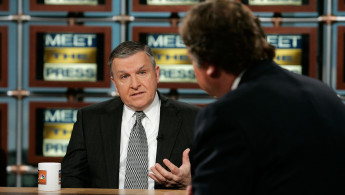US official in charge of resolving Qatar crisis resigns, citing intransigence of Gulf leaders
Anthony Zinni, a retired general and former head of US Central Command (CENTCOM), told US network CBS News he resigned when he realised he could not help resolve the Qatar crisis.
He said this was down to "the unwillingness of the regional leaders to agree to a viable mediation effort that we offered to conduct or assist in implementing".
Saudi Arabia, Bahrain, the UAE and Egypt broke ties with Qatar in June 2017, in parallel with a media smear campaign, accusing Doha of supporting extremists and being too close to Iran, Riyadh's arch-rival.
After cutting off Qatar, Saudi Arabia and its allies imposed a land, sea and air blockade of the emirate and issued a list of 13 demands in order for it to be lifted.
The list of demands included shutting down media outlets Al Jazeera and London-based The New Arab, curbing relations with Iran and closing a Turkish military base in the emirate.
Qatar categorically denies the allegations and accuses the bloc of aiming to incite regime change and hijack its independent foreign policy.
Doha has repeatedly called for equal dialogue to resolve the crisis on condition its sovereignty is respected, but mediation efforts led by the US and Kuwait have failed with the anti-Qatar bloc sticking to its demands.
Zinni joins a long list of high-ranking and long-serving US officials who have been sacked or who willingly resigned from controversial President Donald Trump's team, often on account of his incoherent policy decisions but also following personal rows with the former real estate tycoon and reality TV celebrity.
Last month, US Defence Secretary Jim Mattis resigned in protest at Trump's decision to withdraw abruptly from Syria and abandoning US allies fighting the Islamic State group in the war-torn nation.
Zinni was appointed by Mattis as well as former Secretary of State Rex Tillerson in 2017 to lead mediation efforts in the Gulf to resolve the crisis.
However, Tillerson himself was later sacked by Trump, partly for disagreeing with the president over the US position in the dispute.
Earlier in the crisis, Trump took sides and appeared to back the Saudi-lec bloc but was later pressured into taking the middle ground by the US military, given Qatar's strategic value in the region.
Zinni told CBS News he also felt there was no need for his involvement with the Middle East Strategic Alliance (MESA) concept - the so called Arab NATO - that he was asked to introduce to regional leaders, as other members of the administration are carrying it forward.





 Follow the Middle East's top stories in English at The New Arab on Google News
Follow the Middle East's top stories in English at The New Arab on Google News


